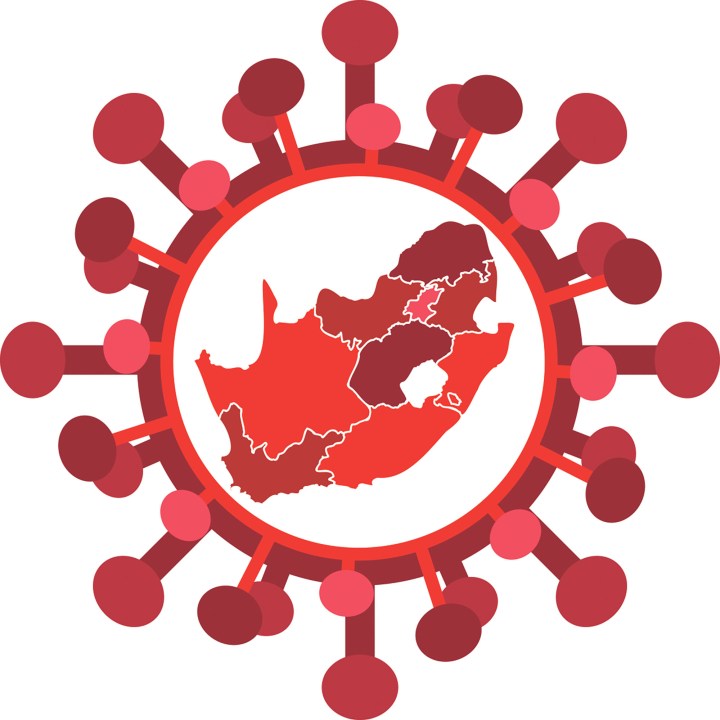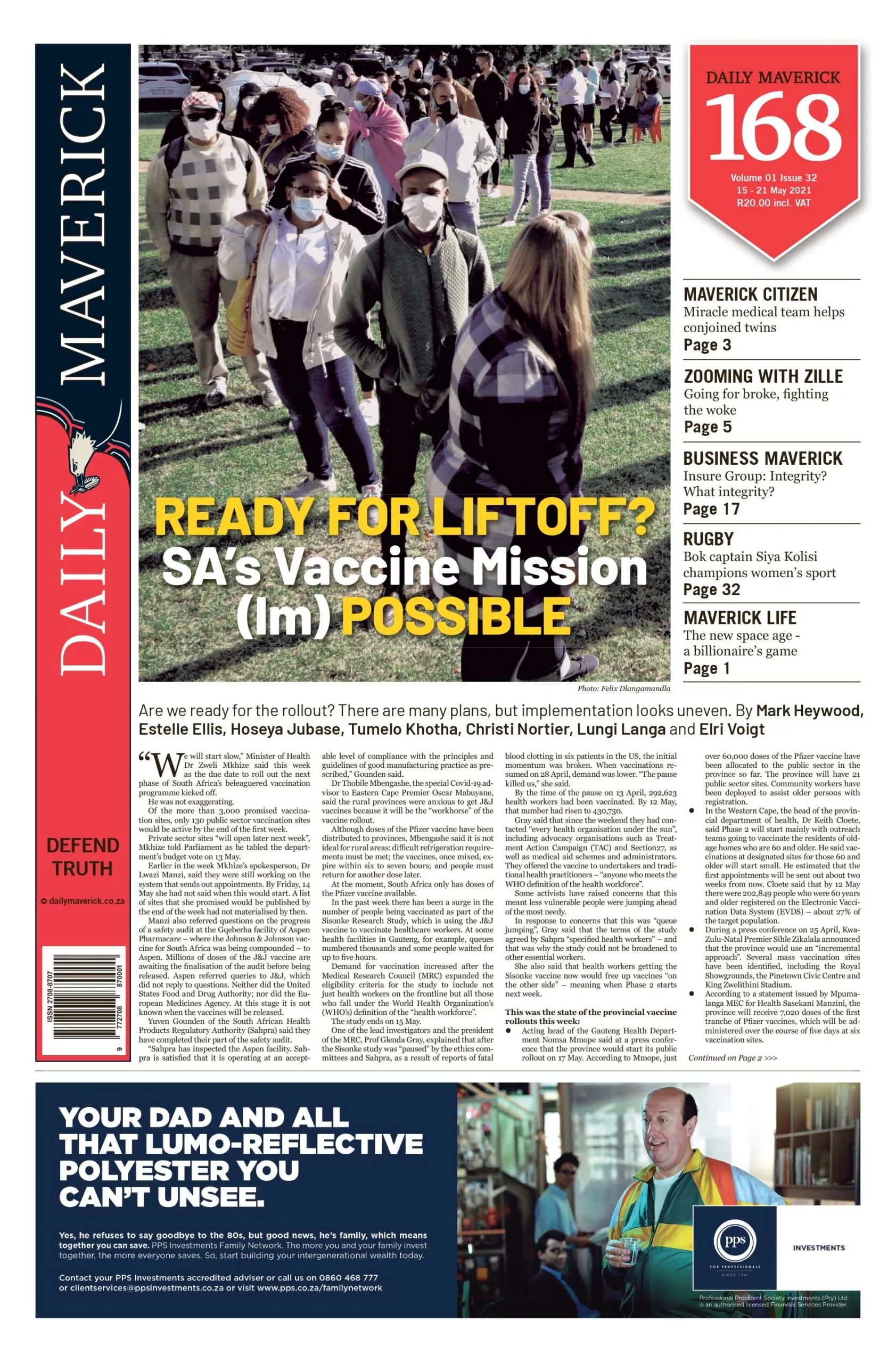DM168 Covid-19
Is Gauteng ready for the third wave?

Gauteng Premier David Makhura says: ‘The bad news is that we in Gauteng are no longer talking about the possibility of a third wave – we are there.’ So what’s the strategy, Mr Premier?
First published in the Daily Maverick 168 weekly newspaper.
Gauteng has surged into a third wave of Covid-19 cases but there has been no clear strategy announced from the premier’s office on how spiking numbers will be managed and how the load on the province’s health facilities will be supported.
Speaking on 14 May at the handover of a 181-bed AngloGold Ashanti mining hospital in Carletonville, intended as a facility to treat an expected rise in numbers of Covid-19 patients this winter, Premier David Makhura said: “The bad news is that we in Gauteng are no longer talking about the possibility of a third wave – we are there.”
Makhura’s spokesperson, Thabo Masebe, received but didn’t respond to questions about government strategies to contain the severity of this third wave.
By 12 May, the Gauteng Department of Health had said in a press statement that a 63% increase in cases was reported over a seven-day period for the province that had by then already recorded 10,700 Covid-19 deaths and more than 430,000 confirmed cases.
In a worst-case scenario produced by modelling at the National Institute for Communicable Diseases (NICD), the outlook for the province shows that Gauteng will be hit harder than in the second wave during December and January.
Professor Alex van den Heever, a social security systems specialist at Wits University’s School of Governance, says the data bears out that provinces that were less severely infected in the last wave, like Gauteng, are on a trajectory to see a surge now, most likely because of a degree of herd immunity coming into play in provinces that were hit more severely in the second wave.
This is one clue to understanding the spread of the virus. Other factors, he says, include the impact of lockdown restrictions at that time and the fact that public health messaging hammered harder on mask wearing, physical distancing, ventilation and restricting gathering in large numbers.
Acting smarter and faster now as the wave rises will help to short-circuit virus transmission and balance the needs of keeping the economy open to support livelihoods, says Van den Heever.
Circuit-breaker interventions must be short-term, targeted, specifically defined and properly enforced.
“It could be an option like a five-day lockdown targeting the closure of pubs and shebeens, and places where people gather indoors and enforcing a curfew,” he says. Such an option is meant to be short enough not to harm businesses but hard enough to pause the spread of the virus.
He adds that strategies also need to include resources for tracking and tracing in hotspots, and better case-by-case assessment. He says, for example, in the case of the cluster outbreak affecting the rugby teams of St John’s College and Krugersdorp High School reported earlier this week, contact tracing, testing and tracking done correctly could have identified the risk more accurately, so that a wholesale temporary closure of both schools could have been avoided. (ED Note: It has since been established that St John’s did not close, but that two grades were sent home. Sport and extra-mural activities were also suspended. We did try to reach the school before publication but had no success. The updated information reached us post publication)
It comes down to better gathering and collecting of information, he says – better analysis of data and better communication of the information.
“It’s a pity that there is a culture of secrecy because people are afraid of being embarrassed, but with no information there is no clarity even if there is a strategy for tracking, tracing and reporting in place.”
More than one year into a pandemic the lessons learned should be that greater transparency is needed, he said. This includes more authority and autonomy to technical bodies such as the NICD, which should be allowed to report and publish data without bureaucratic constraints.
“This idea of the government needing to control the narrative is how the public’s loss of trust in government happens,” he warns.
Already Gauteng citizens have suffered a massive blow with its largest Covid-19 ICU unit now closed. The unit was located at the Charlotte Maxeke Academic Hospital (CMAH) but has been forced to close since the fire there on 16 April.
More than 300 beds are out of action and many of its inpatients at the time had to be moved to the Steve Biko Hospital in Pretoria.
The head of the disaster management committee at CMAH, Prof Steve Moeng, refused to answer any questions, saying that “all information has to come through the office of the premier”.
The hospital was scheduled to be re-opened earlier this week, but doctors told DM168 that the air quality in the facility was so bad they left almost immediately after setting foot into the hospital. “It’s a sick building,” said one specialist.
Prof Mervyn Mer, the head of the still-closed ICU, confirmed that the number of Covid cases were rising again, and said staff had not been given a confirmation date for when the hospital will reopen.
The most recent numbers from the Gauteng Command Council is that there are
“4,064 functional beds: 3,261 for admissions and 803 Quarantine and Isolation (including 150 beds at newly opened Bronkhorstspruit Hospital)”.
The province says that of the 1,575 new critical-care beds planned “800 have been completed and handed over (to Jubilee and Chris Hani Baragwanath Hospital)… 325 beds have been completed but not commissioned/handed over”.
A doctor at George Mukhari Hospital, however, told DM168 they are “not even close to being operational”.
And even if there are enough beds, the deepening concern is that there are not enough health workers in the province to attend to patients. “They employed a lot of nurses around this time last year for a fixed term called ‘Covid contracts’,” said one doctor who didn’t want to be named, “but there are still critical shortages”.
Kwara Kekana, spokesperson for the Gauteng Health Department, told DM168 that the contracts for nurses have recently been extended until April 2022.
Gauteng’s readiness for a third wave will be tested in the coming weeks but the other provinces need to gear up – an upward creep in Covid cases has been recorded across the board.
It was also revealed in the latest data, published on 13 May, from the Network for Genomic Surveillance in South Africa, that a total of 13 cases of the variant currently dominant in India have been detected in South Africa.
Two of these cases were in individuals from Gauteng with no travel history, indicating community transmission.
According to the Department of Health’s most recent media briefing there was an increase in new Covid-19 cases from 8,593 cases in the preceding seven days (26 April to 2 May) to 12,531 cases in the past seven days (3 to 9 May).
The 14-day comparisons also showed that the cases increased from 17,017 in the preceding 14 days to 21,124 cases in the past 14 days, an overall 24% increase.
All provinces showed a positive percentage increase, with Northern Cape showing a 68% increase in the past seven days, followed by Gauteng at 63%, Limpopo at 47%, North West at 42% and the Western Cape at 39%.
The rise in cases across the board comes as South Africa intends to start the vaccine rollout to the most vulnerable people in the general population on Monday 17 May. The rollout has so far been marked by stalling, logistical glitches, politicking, deal-making and general uncertainty about capacity and the ability to scale up adequately to reach the 300,000-a-day vaccination target.
The Sisonke trial, which targeted 500,000 health workers, is meant to wrap up by 15 May. By 13 May the number stood at 455,169, with reports of some healthcare workers still waiting for appointment dates and reports that people had jumped the queues, tried to get family members vaccinated even though they are not health workers, and that there were insufficient vaccines at some sites.
Rollout hiccups will be likely, said Dr Mary Kawonga, chair of the Gauteng Premier’s Advisory Council. She repeated that the vaccine remains the best chance to return to a safer version of life before the pandemic and lockdowns.
“The fact that adults have to get vaccinated is unprecedented. But we’ve also never had a pandemic like this before. Vaccine is the long-term vision to get us out of lockdown, but the shorter-term vision for the vaccination programme is to protect people from dying and from getting severely ill from Covid-19.
“We’re not now saying Oh, we’re sitting at less than 1% of the population vaccinated and we suddenly want to get to 67% where there’s herd immunity – these are the first steps to prevent severe infection and death among those who are most at risk, like our older people and those with comorbidities.”
Kawonga adds that, even with the new variants now being detected in South Africa, including B.1.617, which has had a devastating impact in India, the public messaging is the same: stay vigilant, mask up, maintain physical distancing and don’t gather indoors in big groups. DM168
This story first appeared in our weekly Daily Maverick 168 newspaper which is available for free to Pick n Pay Smart Shoppers at these Pick n Pay stores.
Information pertaining to Covid-19, vaccines, how to control the spread of the virus and potential treatments is ever-changing. Under the South African Disaster Management Act Regulation 11(5)(c) it is prohibited to publish information through any medium with the intention to deceive people on government measures to address Covid-19. We are therefore disabling the comment section on this article in order to protect both the commenting member and ourselves from potential liability. Should you have additional information that you think we should know, please email [email protected].
"Information pertaining to Covid-19, vaccines, how to control the spread of the virus and potential treatments is ever-changing. Under the South African Disaster Management Act Regulation 11(5)(c) it is prohibited to publish information through any medium with the intention to deceive people on government measures to address COVID-19. We are therefore disabling the comment section on this article in order to protect both the commenting member and ourselves from potential liability. Should you have additional information that you think we should know, please email [email protected]"






 Become an Insider
Become an Insider